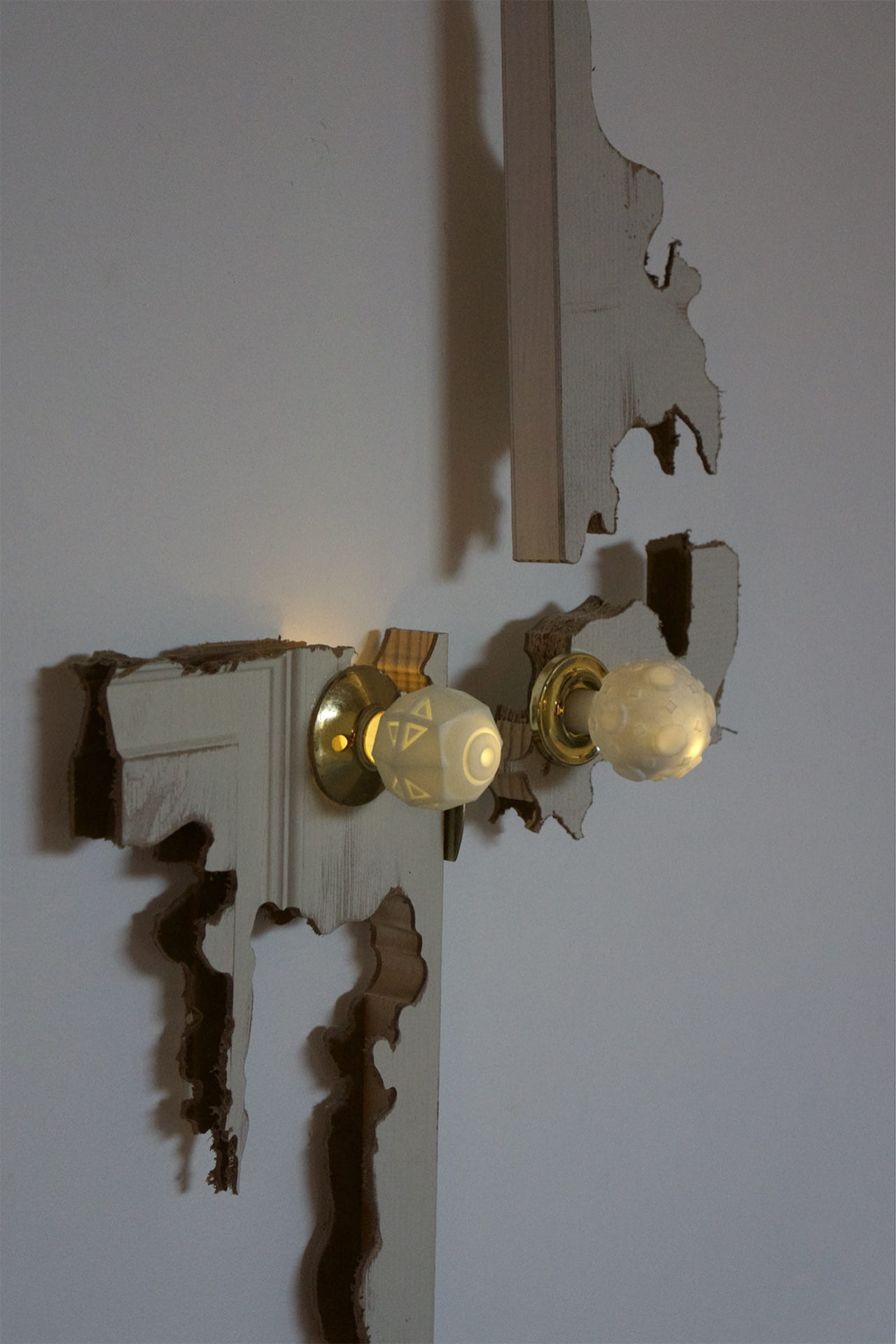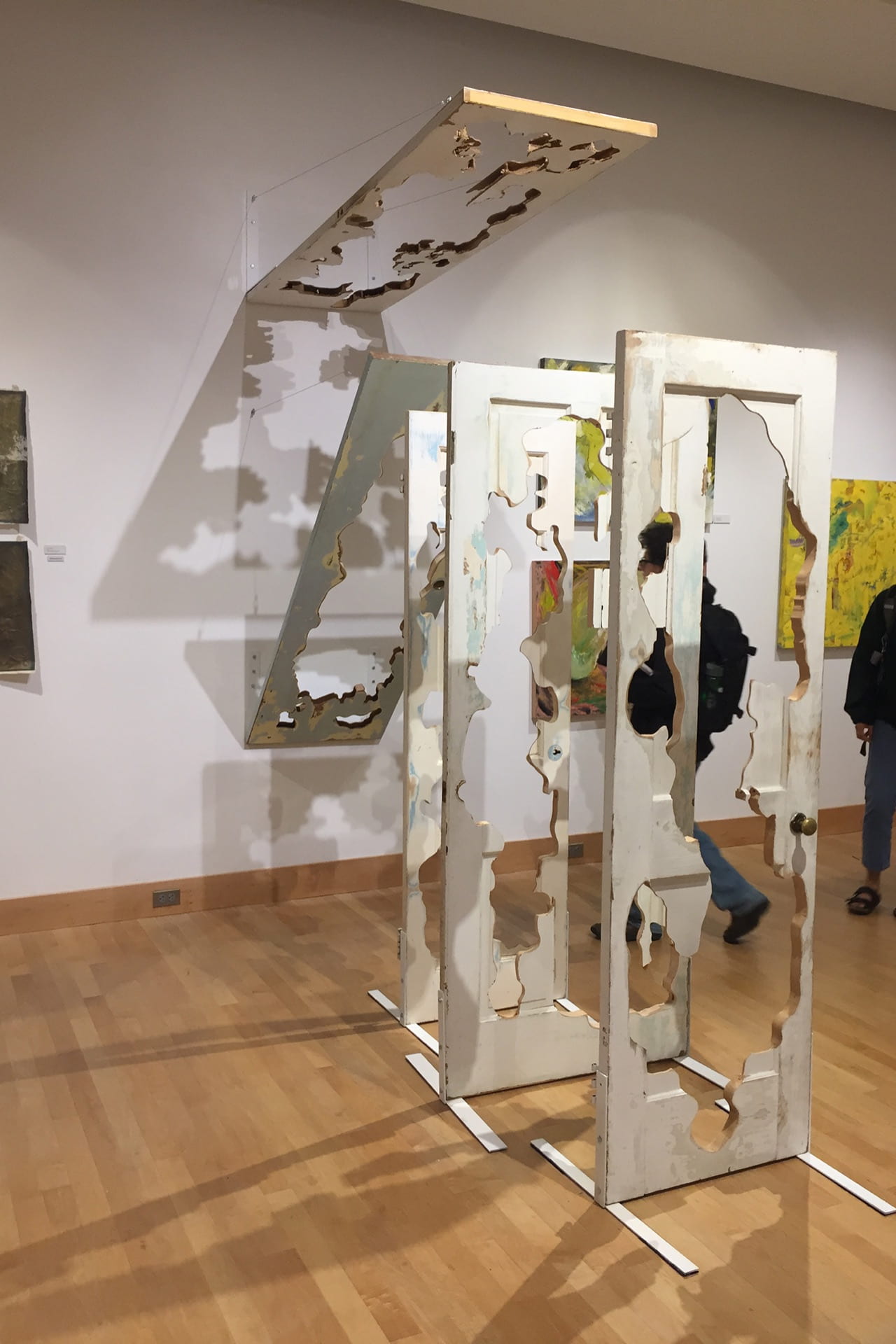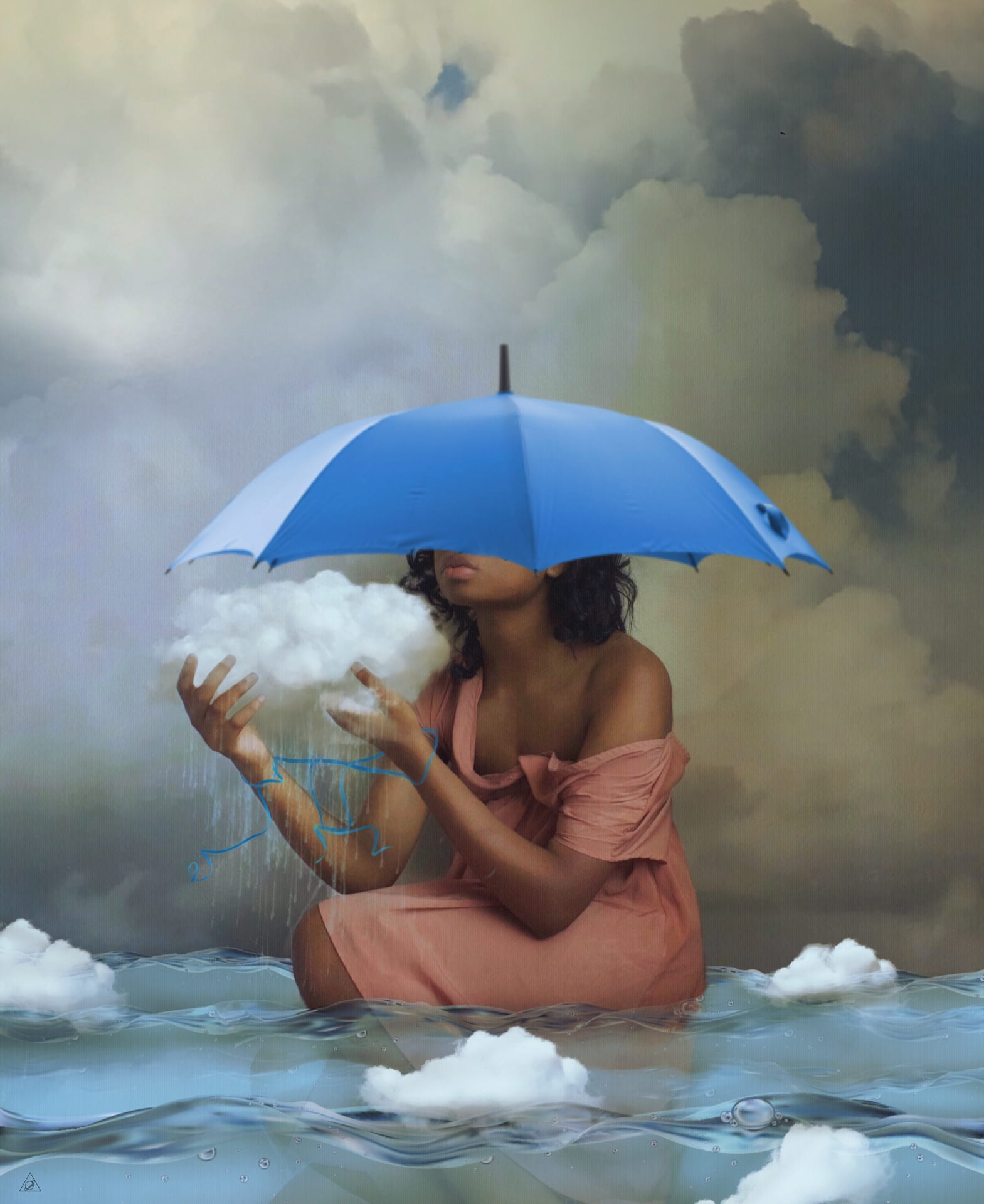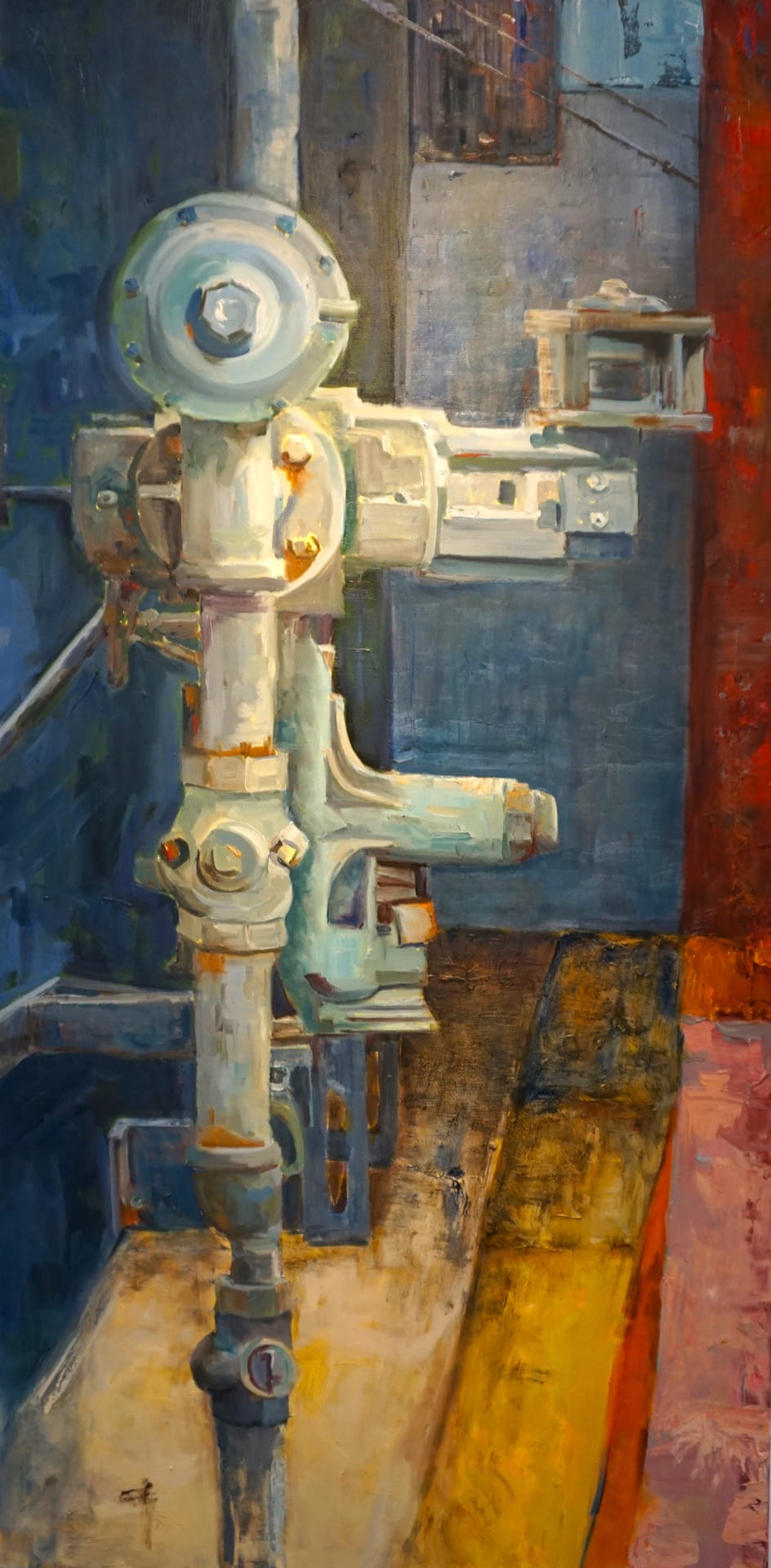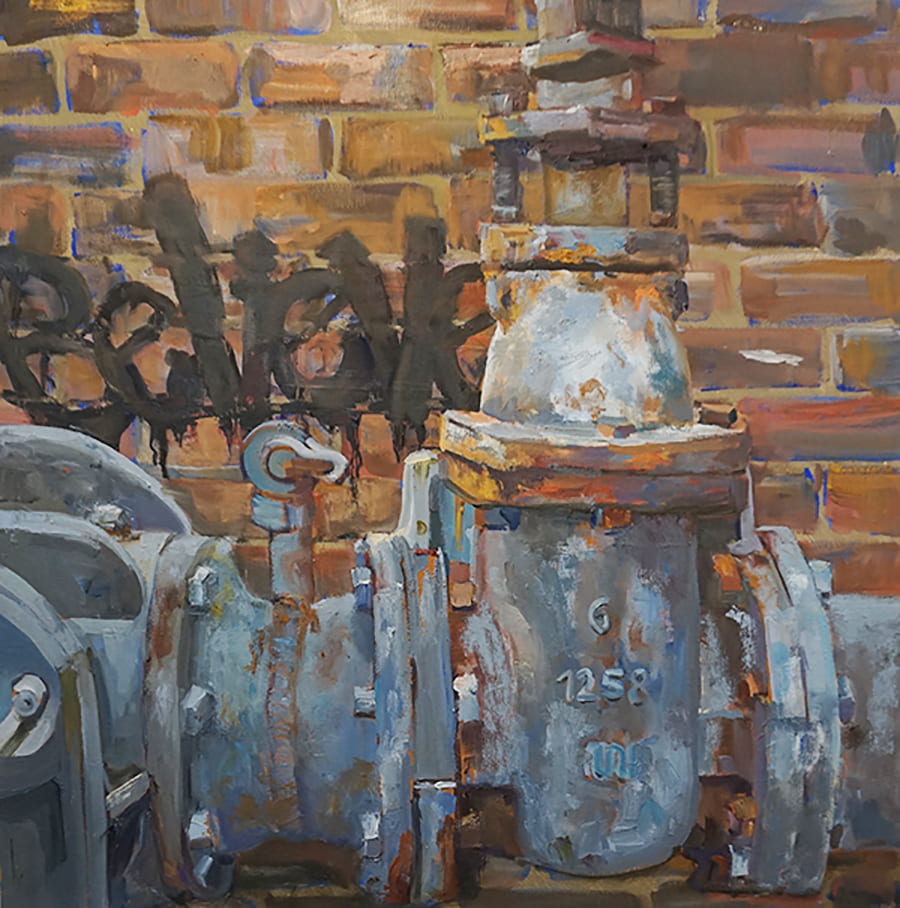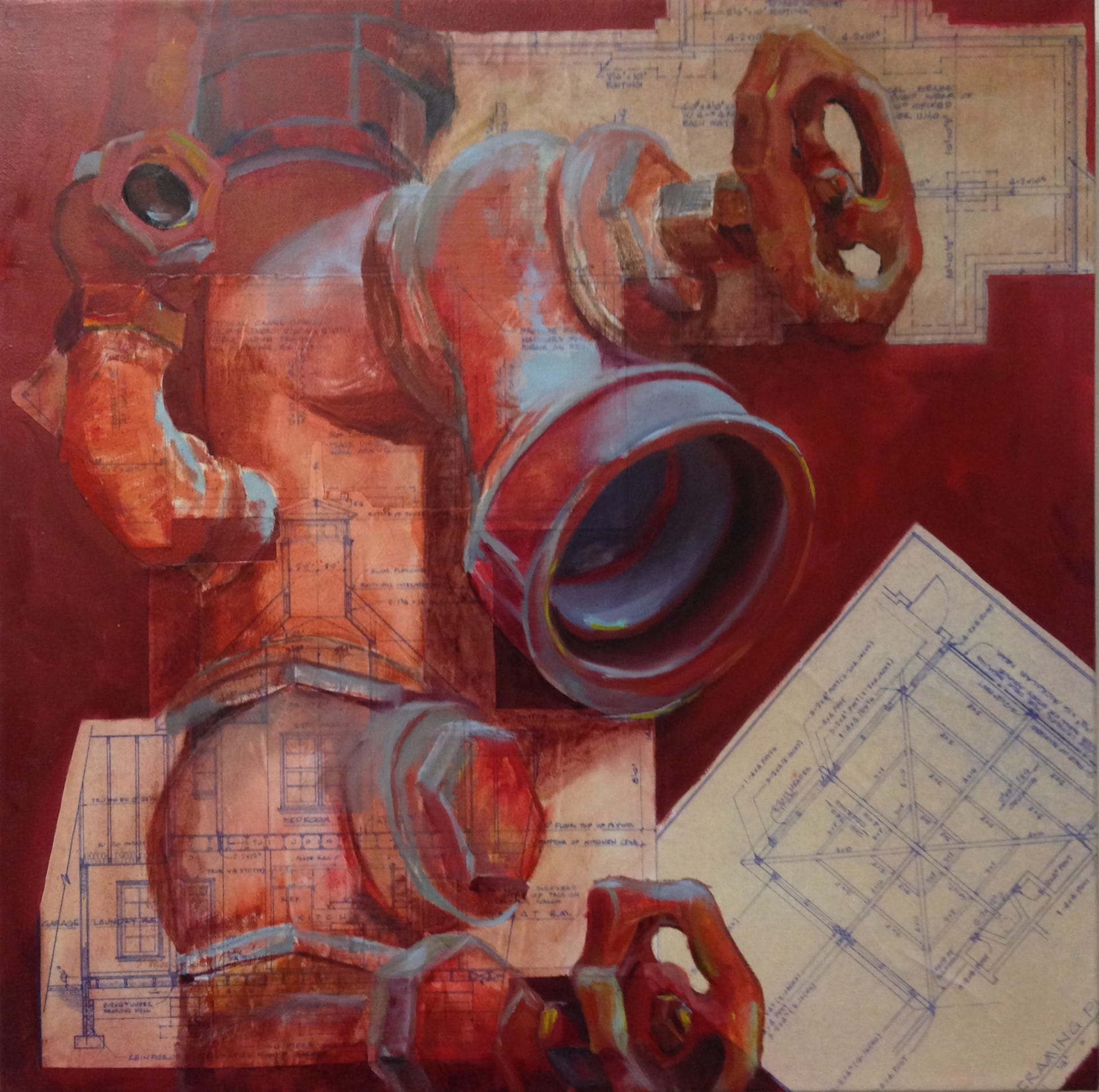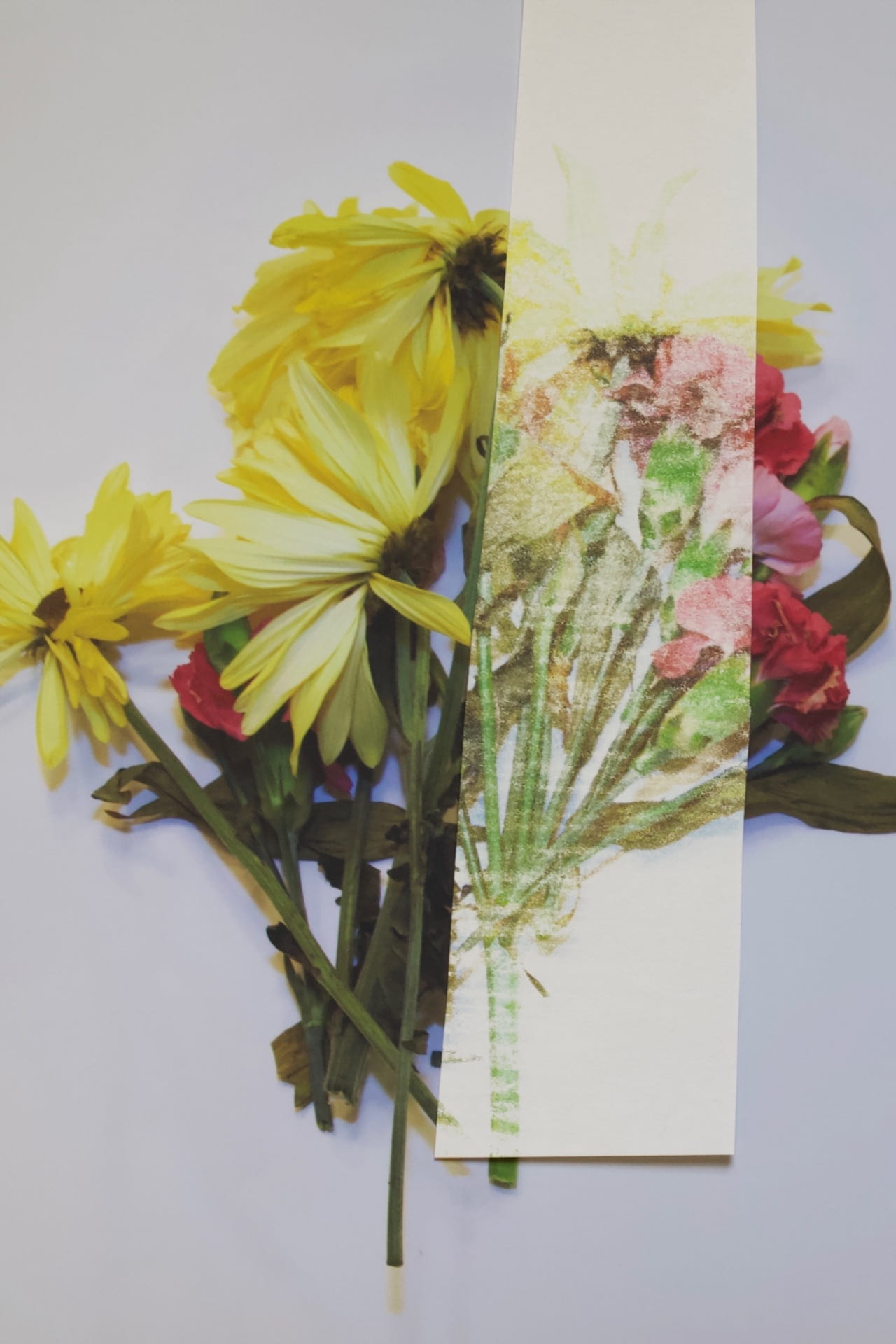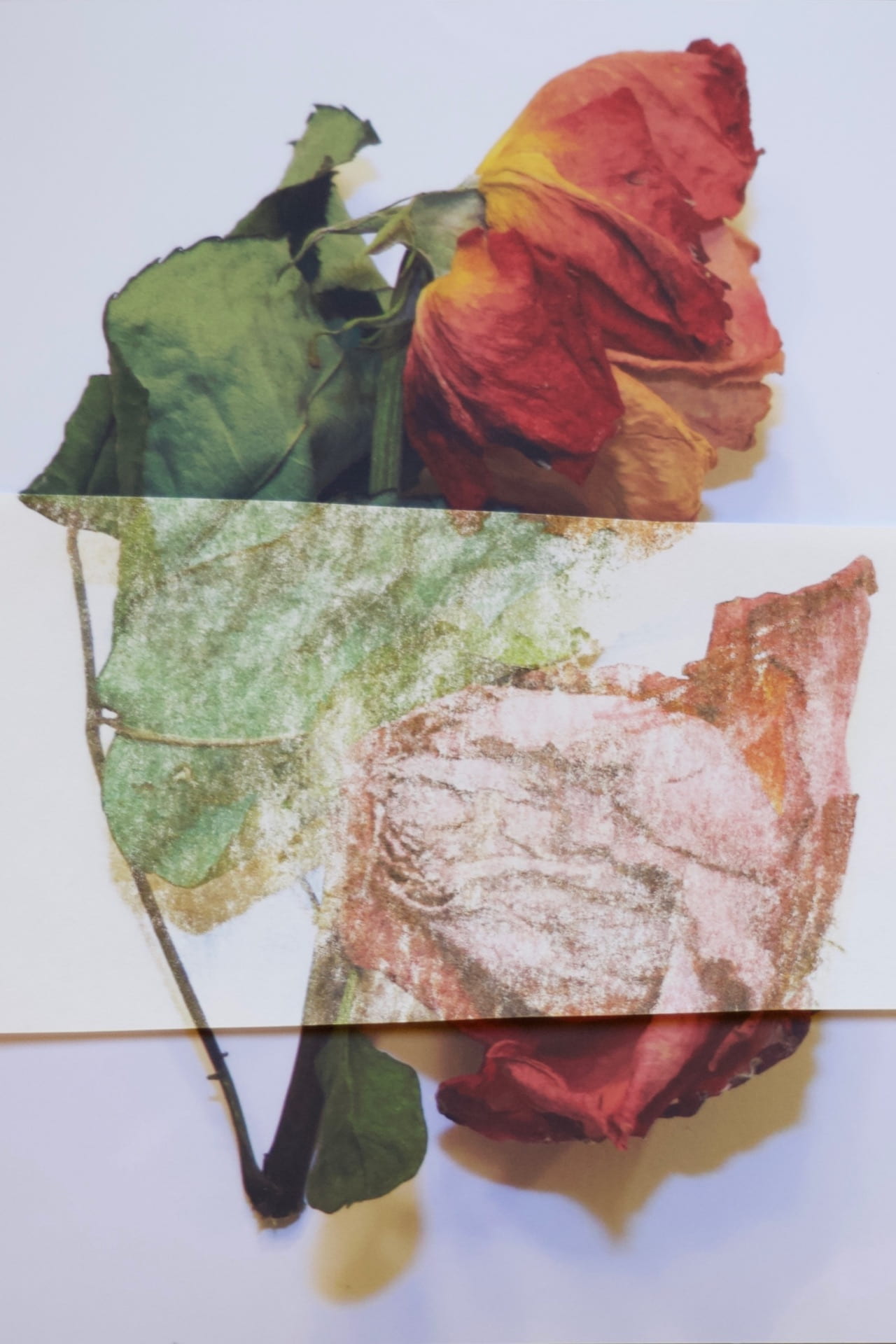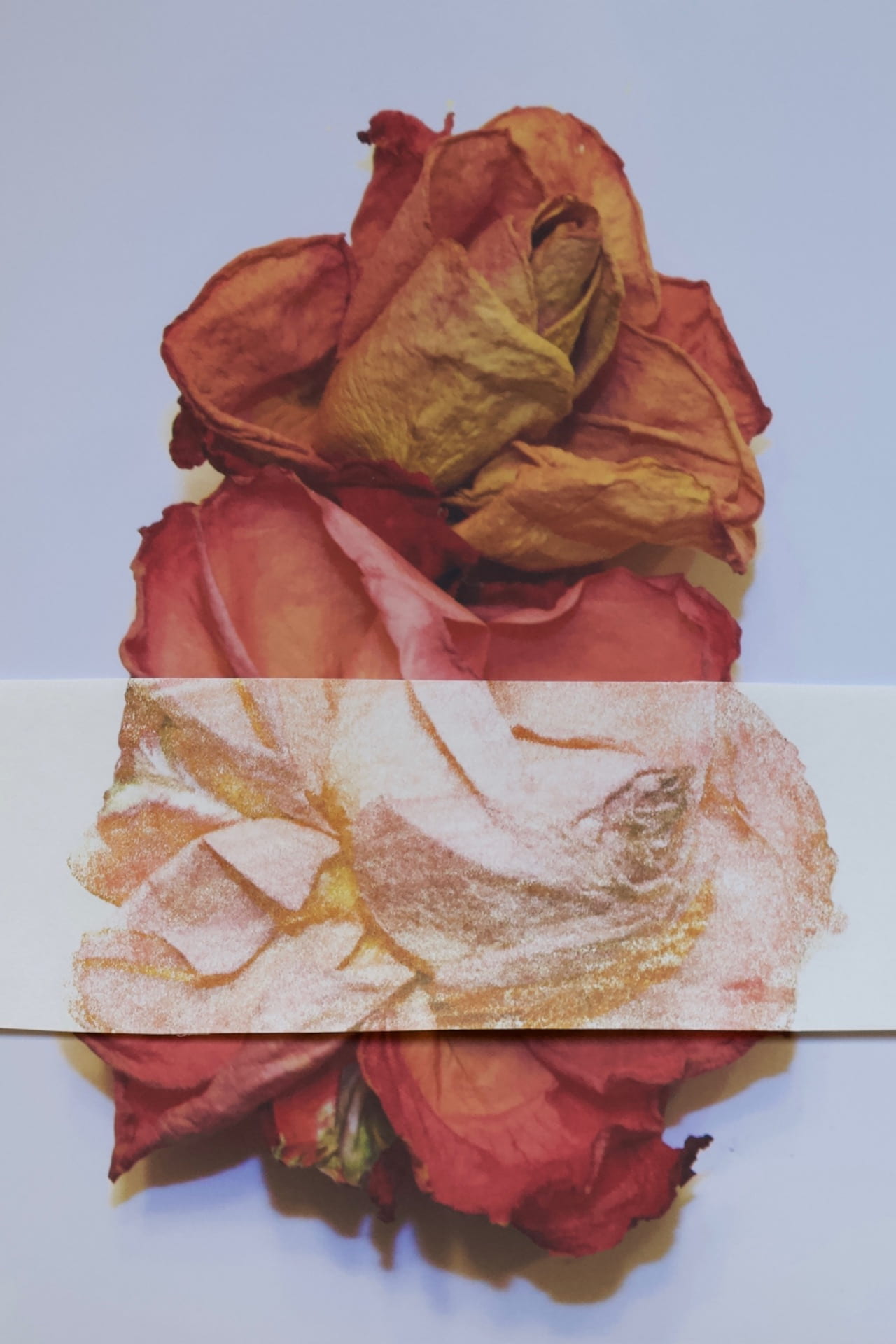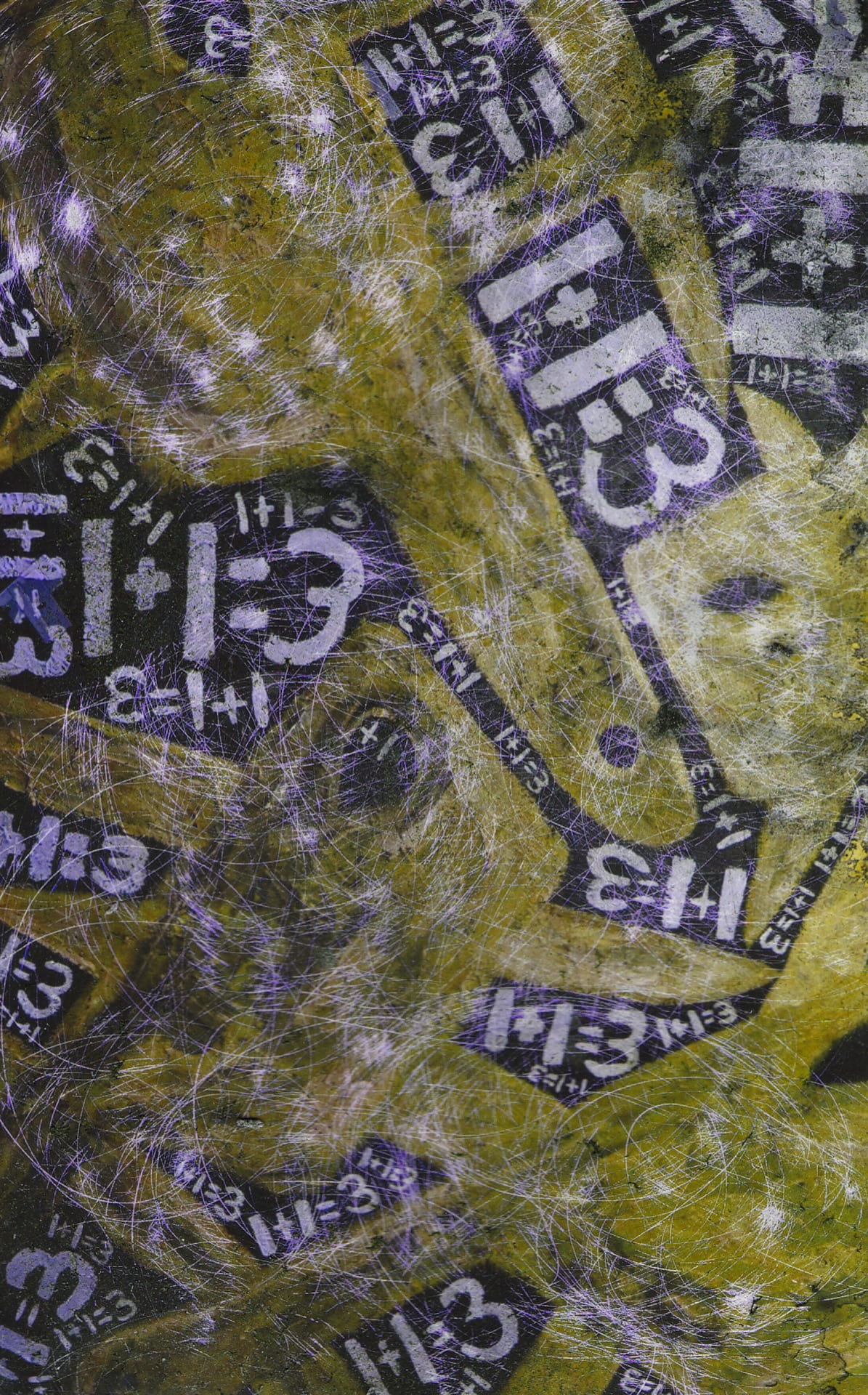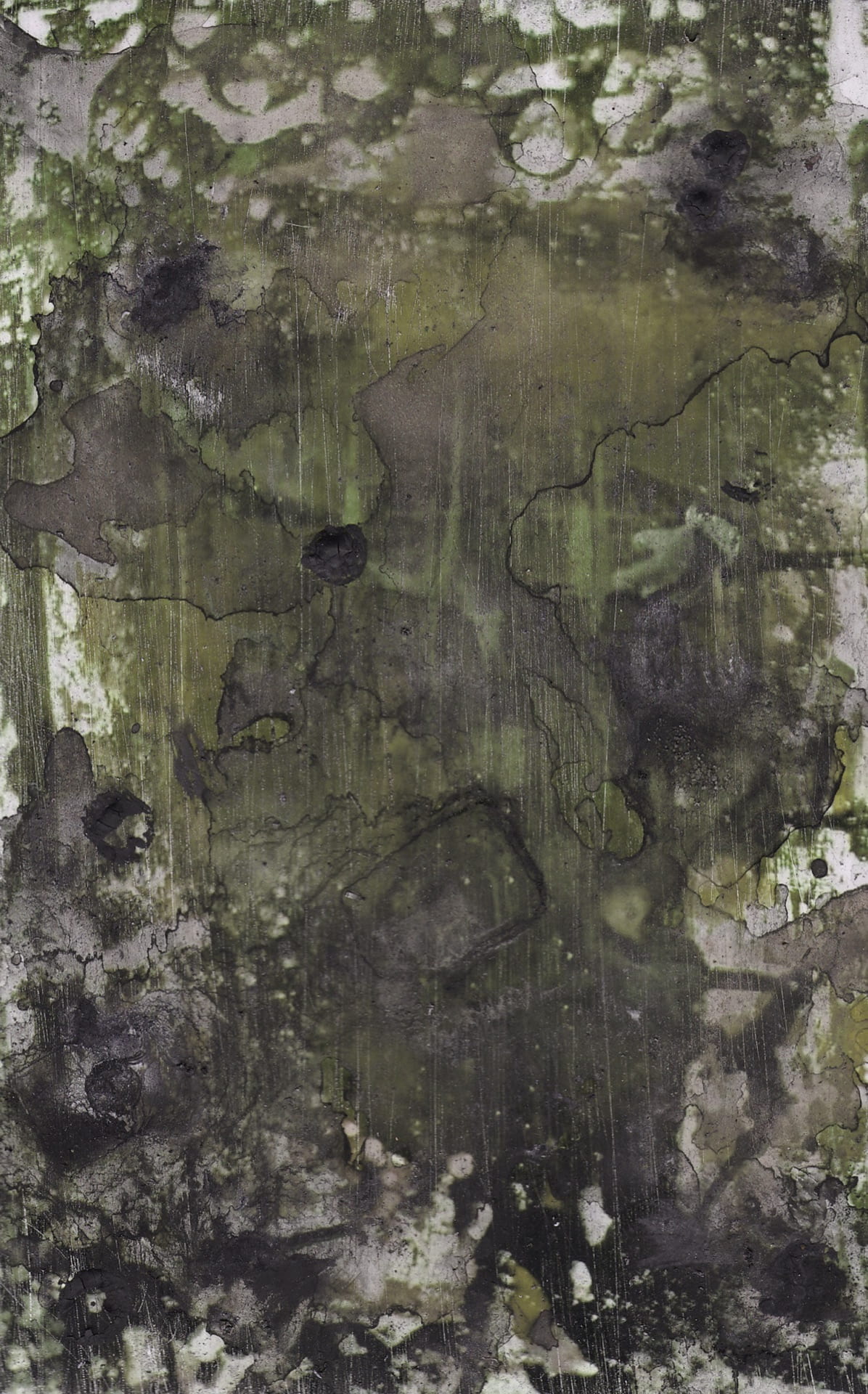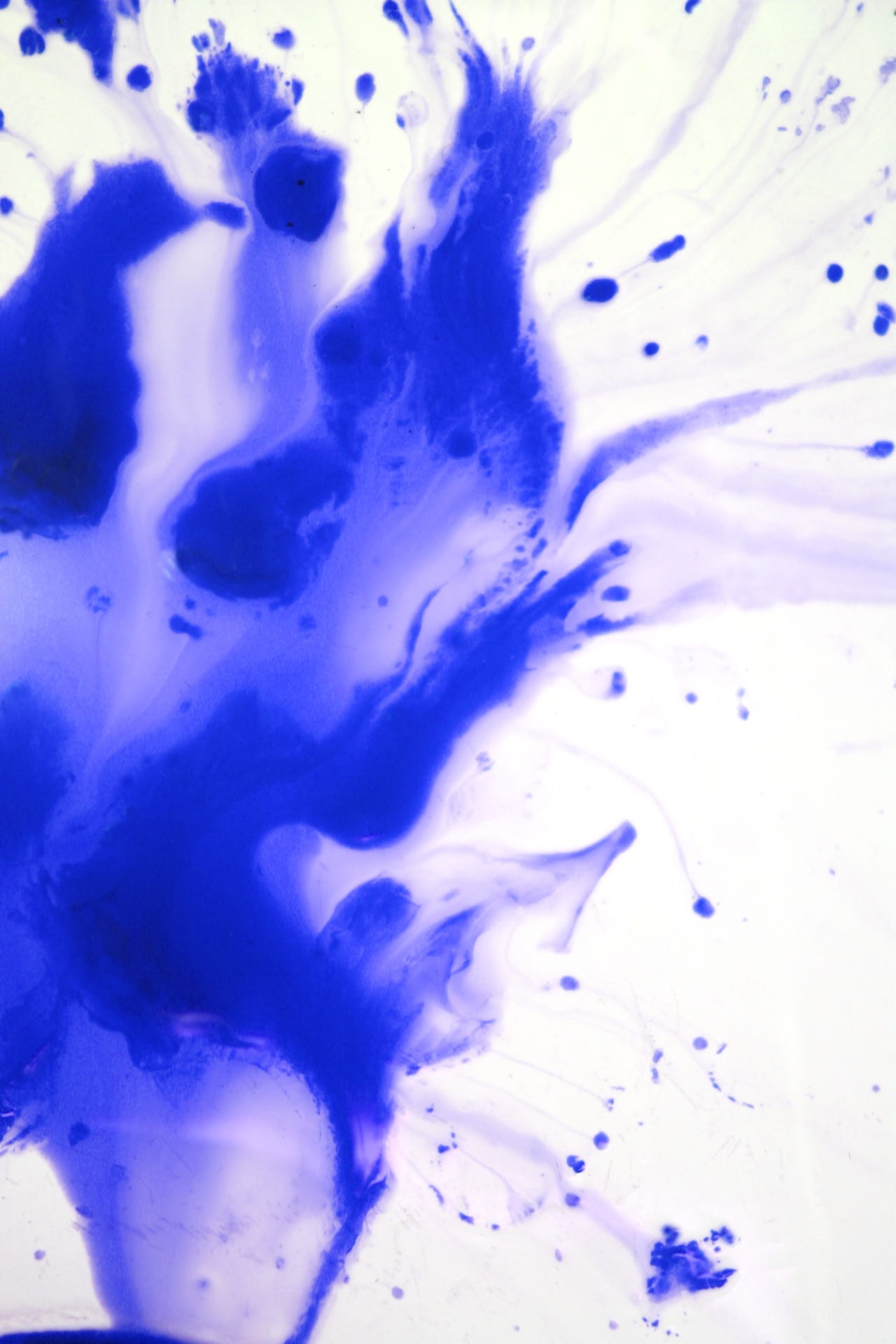Danielle Fauth is a contemporary sculptor with a BFA in Sculpture from Towson University. Her work intervenes with found objects via digital fabrication and mold-making & casting processes. She replicates or alters familiar objects to make them unreal, intangible, of dreams; from our world and one that could be an in-between.
Online Art Exclusive: “Right or Wrong?” by Deandra Lee
Online Art Exclusive: “Arby’s”, “Believe”, “Number 5”, “Italian Valve” by Gillian Collins
Gillian Collins earned her MFA at Towson University in 2019. As a co-owner of residential plumbing and HVAC service companies, her association with these trades artistically inspires Collins. By divorcing the form from the function of mechanical components, she compels the viewer to contemplate the “seen but the unseen” of our engineering feats.
Online Art Exclusive: “A Selection of Reality 1, 2, 4, 5” by Greg Headley
Online Poetry Exclusive: “Days of 1985” by Ellen Kombiyil
“Oh the body! The delight and am I / normal?”
—from The Lost Pages of Anne Sexton1
We who pretended to lie down at parties
with lovers on vinyl couches or wished
we didn’t but wouldn’t admit it, licking
salt from necks, bass leaping with our breath, or was it
expanding/escaping inside us, black light’s
purple stripes transforming eyes/teeth into green
glowing beings, separate, alive, our faces
into negatives, cried. If we did it (we did it)
to feel for a moment if not loved then
wanted: A boy jammed his tongue in my mouth
because the Coke bottle chose me when it spun,
which was my first kiss. I didn’t ask questions.
Or I fielded Ouija board guesses Yes/No/
………Good-bye. Or I walked into that closet,
willingly let them lock it. O, my wasted
adolescence! Assessing vertical stripes
on swimsuits as a function of decreased
belly fat, obsessed with how thighs pooled
when I sat, how absent thigh gap leads to ruin.
I dieted on Cheez Balls (one every 55
minutes, dissolved on the tongue in a pool
of melted butter). Or I teased my hair
to make my face look slimmer. Ruin, from
the Latin ruere, “to fall” as in fall
headlong or with a crash. We were always
falling laughing collapsing unable to stand
our bodies pulsing with want.
1. The book quoted is fictional, wished into existence, as is the quote.
Ellen Kombiyil is the author of Histories of the Future Perfect (2015), and a micro-chapbook Avalanche Tunnel (2016). Publications: New Ohio Review, Nimrod, North American Review, and Ploughshares. Awards: Mary M. Fay Poetry Award from Hunter College; Academy of American Poets college prize; Nancy Dean Medieval Prize.
Online Art Exclusive: “The Deceit of Illogical Numbers,” “The 20 Gauge Plasma Machine Blues,” “The Faces of Death Disintegrate Forever,” and “Destroying Everything One Brush Stroke at a Time” by Brett Stout
 Brett Stout is a 40-year-old artist and writer. He is a high school dropout and former construction worker turned college graduate and paramedic. He creates mostly controversial work usually while breathing toxic paint fumes from a small cramped apartment known as “The Nerd Lab” in Myrtle Beach, South Carolina. His work has appeared in a vast range of diverse media, from international indie zines like Litro Magazine UK to Brown University. He is tired of talking about himself at this point and prefers that his artwork speak for itself.
Brett Stout is a 40-year-old artist and writer. He is a high school dropout and former construction worker turned college graduate and paramedic. He creates mostly controversial work usually while breathing toxic paint fumes from a small cramped apartment known as “The Nerd Lab” in Myrtle Beach, South Carolina. His work has appeared in a vast range of diverse media, from international indie zines like Litro Magazine UK to Brown University. He is tired of talking about himself at this point and prefers that his artwork speak for itself.
Online Poetry Exclusive: “Chronicles” by Isaiah Brown
Junk’d up on adrenaline.
Nobody could tell you anything.
I was grateful enough to move
to your hometown, let alone
become your friend.
Isn’t that the Taylor kid? I heard the
Police searched his house for six hours.
Nobody was ready to see what your
home looked like though.
How you rescued
a dog from the neglect of its drug-
dealing owners.
Nonetheless you were from the wrong
side of the tracks, yet cut so different
from everyone else.
You split the community in half.
Modern day robin hood, only you could do that.
One end of the spectrum left in
grief of a young genuine life taken too soon.
Others commemorated the death
of a bandit.
Almost like they saw the end of an era,
understanding that your dirt bike was never
to be heard in Adamstown again.
You and that bike.
The loss didn’t hit me until it was too late.
I realized I didn’t hear that rust bucket of a machine
ripping down its iconic strip outside my window
anymore. Suddenly your crew made less and
less appearances throughout the town.
I never finished the cigarette you offered during our first encounter.
I only took it so you and your friends wouldn’t think I’m square.
At first, I thought it was cool, that
my peers recognized me as part of your legend.
It was a handful of times we even hung out.
I feel so stupid now! To think a legacy
could fill the void of a fallen soldier.
Now all I am left with is a memorial card, and
posts of your life depicted through Facebook.
Online Fiction Exclusive: “Alien Storytellers Make Contact” by Andrew Gretes
The aliens were disappointing. We expected spaceships and ray guns and creatures with heads the shape of lightbulbs. We got humans—some called them “humanoids” because it sounded more exotic—wearing trenchcoats glazed with wormhole debris. Mostly, they emerged out of storm-drains and toilets and computer screens.
Smiling, terribly affable, the aliens claimed that they too came from Earth. We groaned. What was human history but the story of earthlings invading other earthlings? How cliché. We were so tired of invading ourselves.
But there was one consolation. The aliens weren’t from our Earth, which made the invasion less of a repetition, more of a rhyme. Apparently, there were Counter-Earths: i.e., countless parallel blue dots that all occupied the same mesh of space-time. As one alien explained the matter: “It’s kind of like how ghosts might all inhabit the same blanket…”
They were storytellers. Or so they said. It was hard to verify. They didn’t utter an anecdote, let alone a nice zigzagging plot… you know, one of those tales that might score a nine on the Narrative-Richter scale. No, our aliens were far more interested in eavesdropping than beginning sentences with “Once upon a time…” The aliens propped their feet on our couches and binge-watched Netflix and Disney+ and took notes in tattered journals and said, “Look at the verticality on that cliffhanger!” and “What plottery!”
The invasion showed no signs of letting up. Week after week, aliens emerged out of manholes and chimneys and stained-glass windows and, well, anything remotely mouth-shaped.
Pretty soon, nations divvied up the aliens and even small towns got their very own extraterrestrial diplomat. It was all the rage.
Naturally, our native storytellers were a bit miffed. Their emotional pendulums swung from envious to desperate. Some well-known authors even broke into stranger’s houses, hid inside pantries, and crawled out when it was dinnertime, saying, “Greetings!” pretending that they too were bards from another dimension. These tactics were typically rebuffed with comments like, “False alarm, it’s just Stephen King…” or “Honey, stop recording, it’s only Joyce Carol Oates…again.”
But as time went on, we felt gypped. The aliens seemed to have no intention of regaling us with wondrous tales of adventure and heartbreak and derring-do. All they cared about was frequenting our public libraries and lounging in our movie theaters as they survived on a diet of Milk Duds and Pepsi and popcorn.
Our expectations plummeted. What began as… That year we made contact with aliens and the secrets of the universe unfurled like a cosmic flower… quickly degenerated into… That year aliens showed up and plagiarized our best-sellers.
We even thought about exchanging our aliens, but we could find no return policy in the collars of their trenchcoats.
Finally, as a last resort, we said, “Okay, well, what would these aliens say if they ever deigned to tell a story?”
Everyone had an answer. Pretty soon, contests sprang up and speculative fiction sold out like never before. As the aliens remained mum, we studied them like humanoid-shaped landscapes and sketched their stories.
“I bet this one comes from a version of Earth where some people work as ‘human cup-holders’ and accompany people on long drives, holding their beverages and discussing the weather and the meaning of life…”
“I bet this one comes from a version of Earth where you’re required to disseminate an instruction manual on how to ‘use’ you in order to prevent miscommunication and intimacy problems …”
The aliens encouraged us. They smiled and said “Well imagined!” and “Very possible!” For aliens, they were incorrigibly polite. It wasn’t long before they were packing up their belongings and staging a mass exodus, hopping into a variety of holes and warping back to their own worlds.
We said, “Wait, that’s it?! After all this time, you won’t even tell us a single story?”
They looked puzzled.
We said, “You’re storytellers… well, at least nominally… don’t you tell stories?”
They said, “We just did! Millions of them.”
We said, “No, we told those stories. You just sat there and posed.”
Again, they looked puzzled.
We said, “Look, just because nature abhors a vacuum doesn’t mean the vacuum should get credit for the story that nature tells.”
They said, “You know, that’s the oddest thing about this Earth.”
“What?”
“You never give credit to the ghost-writers—the real ghost-writers—all those unsung voids and question marks and vacuums.”
“Sure, but what would those voids be without us?”
“What would you be without them?”
It was our turn to look puzzled.
The aliens took advantage of our collective head-scratching and said, “With us, all writing credits are attributed to bafflers.”
“Bafflers?”
“Those which baffle.”
“But—”
Before we could justify ourselves and offer a retort to all the other judgy parallel Earths in existence, the aliens leapt into nearby craters and disappeared.
We felt robbed. We felt accused. We felt chatty. It was like a big fat portal had been carved into our mental ice, and now there was nothing left to do but go fishing.
What did we catch?
Well, for starters, writing credits were dramatically increased. A single author became an absurdity. Authors like “the enigma of consciousness” were tacked on to psychology books, “the conundrum of antimatter” to sci-fi novels, “the riddle of attraction” to rom-coms. Cumulonimbus clouds and daffodils were finally given credit for co-authoring William Wordsworth’s poetry, while ideas like “god-complex” and “necromancy” were given posthumous billing for Mary Shelley’s Frankenstein.
In short, the world felt more and more like a collaboration between inspiration and inspired, and we (as perhaps the most egotistical Earth in existence) became a smudge more comfortable with opening our mouths and letting out narratives and not fussing over who was doing the telling and who was being told.
Andrew Gretes is the author of How to Dispose of Dead Elephants (Sandstone Press, 2014). His fiction has appeared in New England Review, Willow Springs, Witness, Sycamore Review, and other journals.
Online Nonfiction Exclusive: “there are things that your privilege will not let you see” by Jola Naibi
……….like the woman in church who asks me a question like I should know the answer because my skin is a certain color & when I tell her that I do not know the answer she tells me she likes my accent & asks me where I am from originally & I tell her that I am Nigerian & there is no originally in my story & I am still from there & she gasps & tells me that she has heard about the girls & how lucky I am to come to this country & to get an education & what a shame it is what is going on in that part of the world as if she is immune to that sort of thing & I think she believes that because she knows some trending news story she knows all about that part of the world so I tell her that I did not learn to speak English in these United States nor did I attend school here & I went to an all girls school in Nigeria & my mother went to an all girls school in Nigeria & her mother went to an all girls school in Nigeria & we were never kidnapped & what happened with the girls is sad & unfortunate & can happen anywhere in the world when things start to fall apart
……….even here
……….& I can see that she is taken aback & I am taken aback because she is taken aback & I am taken aback because she is unable to see beyond her own privilege
……….like the man who spends six months in Cape Town & begins to parade himself as an expert on Africa & takes offence when someone points out that Africa is not a country & he is adamant that he is African now & I want to tell him that I have lived in his country for more than a decade & I am still called an alien
……….but I remain silent because I am too hurt to speak & I know that if I open my mouth I will unleash a torrent of anger that will be misunderstood & I remain silent because I know there will come a time when I will talk
……….& that time comes when the children are separated from their parents at the border & a man says to me that he does not know how any parent would put their children through that sort of thing in the first place & I ask him if he thinks the parents are deriving any pleasure in taking their children through such a perilous journey & I share with him the poem home by Warsan Shire in which she says that
……….no one leaves home unless home chases you
……….fire under feet
……….hot blood in your belly
……….no one leaves home until home is a sweaty voice in your ear
……….saying
……….leave
……….run away from me now
……….I don’t know what i’ve become
……….but i know that anywhere
……….is safer than here
……….& I remind him that the families at the border are not any different from his that the children at the border are not any different from his two sons and one daughter & that if he was in that position he would do the same thing & that we are all vulnerable to the vicissitudes of life
……….& he looks down in silence & I hope I am getting through
……….I hope I have been able peel back the layers that have made him blind to certain things
……….I hope that I am able to let him see the things that his privilege will not let him see
Jola Naibi was raised in Lagos, Nigeria, studied in the U.K., and now lives in the U.S. Reading and writing fuel her energy, and her first book, Terra Cotta Beauty, is a collection of short stories set in Lagos, which was published in 2014. She writes as she remembers.
Online Nonfiction Exclusive: “Orbs of Feelings” by Kelly Flanagan
I abandoned orange bottles of pills on my dresser. My desk lamp shone through them as they became orange orbs of feelings. Prescription feelings. This one calmness; this one love; this one eternal happiness.
I laughed very deeply and inaudibly. Though my countenance did not change even slightly. I sat in bed breathing shallowly and removing each feeling from its bottle. Kindness is a mango and white capsule. Tenderness in the left color and a peaceful heart in the right.
You should know that for happiness, you have to combine a few types. Six light, sky blue tablets will remove your inner turmoil and any questions about mortality and the meaning of life. Remember to add 600mg of equanimity in the morning and regularly throughout the day so as to maintain a consistent saturation.
The red capsule in the mornings along with the two white “horse pills” as my aunt used to say. There are the tiny white ones. Take exactly seven as they’re low dose.
My doctor, a gifted mixologist. Hints of apple in my basil gimlet cocktail of drugs.
Donning authority and bleached robes, he assures me I need these colors to become ok. I thank him.
With the dissolvable tablets, I know the sugar and anxiety will dissolve sweetly under my tongue.
It may even be funny to some heavenly observer when the 1.5mg of mood-swinging-withdrawal changes my entire body and thrusts me into a pool of clouds I try desperately to climb out of into that clearer air, all light sky blue.
But I can’t get a grip on that vapor. I can’t climb out of what doesn’t exist.
I wonder, sort of intently, if I really exist either. It feels like it’s possible I’m just a mango-colored orb that swallows its feelings.
I’ve asked around, but no one’s sure.
Kelly Flanagan is a memoirist and blogger in Washington, DC. Her writing focuses on resilience, personal agency, and life’s evolutions. International immersion and philosophy flavor her perspective. Kelly has an MA in International Relations from Johns Hopkins University and is completing an MFA in Creative Writing at University of Baltimore.
